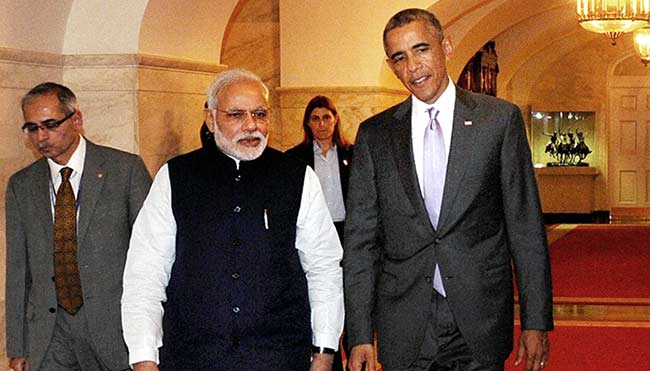By Arun Kumar
Washington, May 7 (IANS) Prime Minister Narendra Modi has said India and the US were natural allies and instead of asking what one can do for the other, they should look at what they can do together for the world.
“If I have to describe the India-US relationship in a single word, I will say we are natural allies,” he said in an exclusive interview with Time magazine for next week’s cover feature titled “Why Modi Matters”.
With a picture of the prime minister in a light saffron kurta and white churidar on the cover, the magazine says “The world needs India to step up as a global power” as it asks: “One year in can Prime Minister Narendra Modi deliver?”
“I think the relationship between India and US, and the two countries in themselves, have played an enormously important role and continue to play an important role in strengthening democratic values all over the world,” Modi said.
“What should the India-US relationship be, what India can do for the US, what the US can do for India, I think that is a rather limited point of view to take,” he said.
“The way we should look at it is what India and the US can together do for the world … strengthening democratic values all over,” Modi said.
“That is the perspective in which we approach our relationship with the United States.”
Speaking mostly in Hindi, Modi talked about everything from his ambitions for India to the global war on terrorism to what personally moves him.
Asked who else would he say were India’s other natural allies, Modi, who has visited 16 countries already this year, said: “Each country has its own importance and each relationship has to be viewed in its own perspective… that is different from each other.”
“If you look at the India-US relationship for example, the role that the Indian diaspora has played in the relationship is extremely crucial,” he said.
“Also our worldview… in addition to our shared democratic values, there are convergences in our worldview on different situations in the world,” he said.
Asked about India’s sometimes tense relations with China, Modi said: “For nearly three decades there has been, by and large, peace and tranquillity on the India-China border.
“Not a single bullet has been fired for over a quarter-century. Both countries are showing great maturity and a commitment to economic cooperation.”
On tackling the threat of terrorism, Modi said one “should not look at terrorism from the nameplates — which group they belong to, what is their geographical location, who are the victims.
“These individual groups or names will keep changing, he said calling for the passage of the UN’s Comprehensive Convention on International Terrorism.
“We need to delink terrorism from religion — to isolate terrorists who use this interchange of arguments between terrorism and religion.”
“Several countries used to see terrorism as a law-and-order situation of individual countries. We should see it as something that is a fight for human values,” Modi said.
On the possibility of the Taliban’s returning to power in Afghanistan, Modi said the drawdown of US troops was an independent US decision, but it was “important to hold consultations with the Afghan government” in the interest of a stable government in Kabul.
Modi said his biggest challenge on becoming the prime minister “was that I was new to the federal government structures” and each department seemed to be working in independent “silos”.
“My effort has been to break these silos down, (so that) everybody… looks at a problem in a collective manner. I see the federal government not as an assembled entity but as an organic entity,” he said.
On whether economic reforms have gone far and fast enough, the prime minister said when he came to power last year, nothing seemed to be happening in the government. There seemed to be a complete policy paralysis.
“The whole world is, once again, excited and enthusiastic about India and the opportunities that India represents.
“Whether it is the IMF, the World Bank, Moody’s or other credit agencies, they are all saying in one voice that India has a great economic future,” Modi said.
Asked whether he would like to have the kind of authoritarian power that China’s leader has, Modi said: “India is a democracy; it is in our DNA.”
“If you were to ask me to choose between democratic values and wealth, power, prosperity and fame, I will very easily and without any doubt choose democratic values.”











